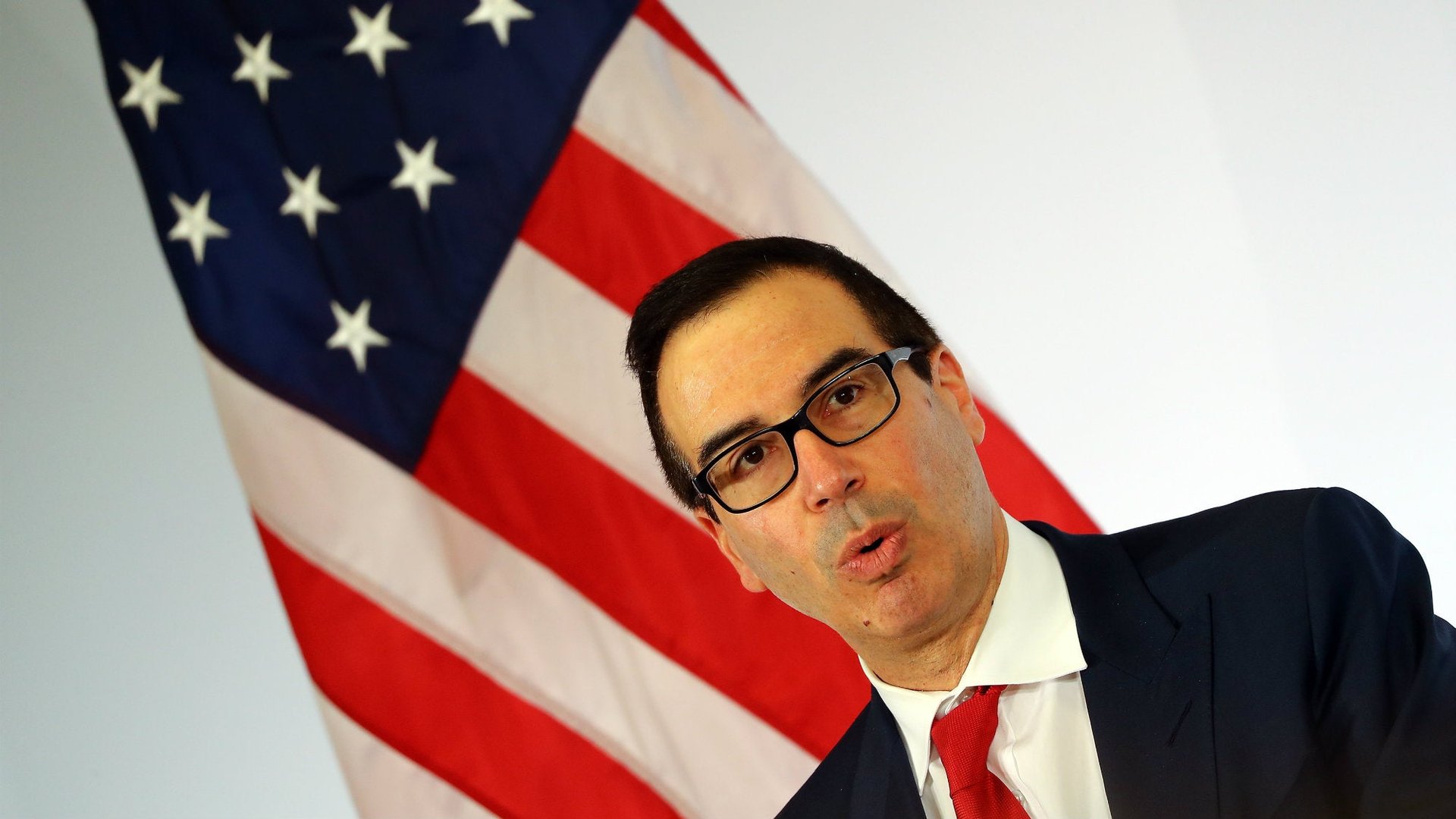The US has officially turned its back on free trade
The group of nations that comprise the G20 account for four-fifths of global GDP and three-quarters of trade. The forum was founded for finance ministers to promote international economic stability. Since it started in 1999, the G20 “regularly sends clear messages against protectionism” at its meetings.


The group of nations that comprise the G20 account for four-fifths of global GDP and three-quarters of trade. The forum was founded for finance ministers to promote international economic stability. Since it started in 1999, the G20 “regularly sends clear messages against protectionism” at its meetings.
Until now.
As Angela Merkel held awkward talks with Donald Trump in Washington, the US president’s team generated its own share of angst back in the German chancellor’s home country. At a meeting of G20 finance ministers in Baden-Baden, global leaders hoped US treasury secretary Steven Mnuchin would present a tempered version of Trump’s aggressive US trade policy. Instead, Mnuchin pushed back hard on Trump’s hostility to trade, which was embodied in his “America First” policies.
The result was a small but symbolic break with history: The anti-protectionist pledge that followed the past six meetings in a row—and many more before that—was dropped in yesterday’s post-summit statement. “The historical language was not relevant,” Mnuchin said at a press conference.
Spot the difference:
February 10, 2015: Istanbul, Turkey“We will stick to our previous exchange rate commitments and will resist protectionism.”
April 17, 2015: Washington, DC“We reaffirm our previous exchange rate commitments and will resist protectionism. “
September 5, 2015: Ankara, Turkey“We will refrain from competitive devaluations, and resist all forms of protectionism.”
February 27, 2016: Shanghai, China“We will resist all forms of protectionism.”
April 15, 2016: Washington, DC“We will resist all forms of protectionism.”
July 24, 2016: Chengdu, China“We will resist all forms of protectionism.”
March 18, 2017: Baden-Baden, Germany“We are working to strengthen the contribution of trade to our economies.”
As seen in Davos earlier this year, China emerged as the staunchest supporter of free trade, according to reports from Germany. The US meanwhile insisted on a softer commitment on trade and flatly refused to reject protectionism, a reversal of its usual role. “The result is a warning shot for every trading nation,” an economist told Reuters after the meeting.
Although the “p-word” hasn’t appeared in every statement following the finance ministers’ summits—a trio of meetings in 2014 only pledged to “enhance trade”—it has almost always featured. Like so:
July 20, 2013: Moscow, Russia“We will resist all forms of protectionism and keep our markets open.”
November 5, 2012: Mexico City, Mexico“We are firmly committed to open trade and investment, expanding markets and resisting protectionism in all its forms.”
February 18-19, 2011: Paris, FranceWe will refrain from introducing, and oppose protectionist trade actions in all forms and recognize the importance of a prompt conclusion of the Doha negotiations.
October 23, 2010: Gyeongju, Korea“Specifically, we will… continue to resist all forms of protectionist measures and seek to make significant progress to further reduce barriers to trade.”
September 5, 2009: London, UK“We… reaffirm our commitment to fight all forms of protectionism.”
November 9, 2008: Sao Paulo, Brazil“We urged all countries to resist protectionist pressures, whether in respect of trade or investment.”
November 18, 2007: Kleinmond, South Africa,“We reaffirmed our commitment to maintain open trade and investment regimes and to resist protectionist pressures.”
November 19, 2006: Melbourne, Australia,“G20 members warned of the threat to global prosperity from rising protectionism in trade and investment.”
October 16, 2005: Xianghe, China,“We urge all parties concerned to provide the necessary political impetus to… fight protectionism.”
(Statements earlier than 2005 didn’t name-check protectionism, but instead stressed things like “trade liberalization” and “the benefits of globalization,” which were in a similar spirit.)
Government leaders have been meeting under the G20 banner since 2008 and have a more consistent record compared to their finance ministers, . All 11 of the statements following head-of-state summits have vowed to “reject,” “resist,” or “fight” protectionism.
Their next meeting is in Hamburg in July. The way things are going in Washington, this language is unlikely to be repeated.